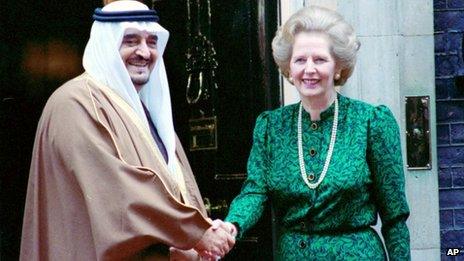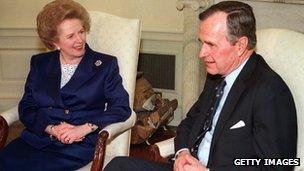Baroness Thatcher's lasting legacy in Middle East
- Published

Baroness Thatcher was closely involved in the talks that led to the al-Yamamah arms deal with Saudi Arabia
Baroness Thatcher famously told President George Bush not to get "wobbly" after Saddam Hussein sent Iraqi troops into Kuwait in 1990. She had to watch the consequences of his firmness from the sidelines, as she had been removed from office by her own MPs in the last weeks before the American-led invasion of Iraq and Kuwait began in January 1991.
Lady Thatcher's belief in the importance of Britain's relationship with the United States was only part of the reason why she sent RAF aircraft to Saudi Arabia within 48 hours of the invasion of Kuwait in August 1990, and soon after started the deployment of what became a force of more than 53,000 British troops.
Her response to what was happening in Kuwait was conditioned by her own experience of the war to recapture the Falklands Islands from Argentina in 1982. And Britain had its own reasons to protect oil supplies from the Gulf, and what had become a highly lucrative business relationship with Saudi Arabia.

Baroness Thatcher believed in the importance of Britain's special relationship with the US
Britain had pulled its military forces out of the Middle East after the decision to retreat from east of Suez in the 1960s.
The UK's Middle Eastern moment appeared to be over, so when the Thatcher government rushed troops to Saudi Arabia in 1990 the British army had to announce that it no longer had desert pattern uniforms. Embarrassingly, it emerged that it sold its stocks to Iraq in the 1980s.
But Britain had retained big business interests. From early on in her premiership Mrs Thatcher had recognised the commercial possibilities in the Gulf.
She was closely involved in the negotiations that led to the al-Yamamah arms deal, selling British warplanes worth tens of billions of pounds to Saudi Arabia.
The deal has also been surrounded by allegations that bribes were paid to members of the Saudi royal family.
Since the first war against Iraq in 1991, many thousands of British soldiers have spent time in the Middle East. Mrs Thatcher's government revived Britain's political and military role in the region, which continues.
Since Margaret Thatcher's death was announced both Israel's president and prime minister have praised her support for their state.
During her time in Number 10 though, Britain was one of the first Western countries to establish relations with the Palestine Liberation Organisation, pressing it to recognise the existence of Israel.
In 1989 she sent William Waldegrave, then a junior minister in the Foreign Office, to Tunis to meet PLO officials and eventually the Palestinian leader Yasser Arafat.
It was one of the steps that led to the Oslo process, the attempt to make peace between Israel and the Palestinians in the 1990s.